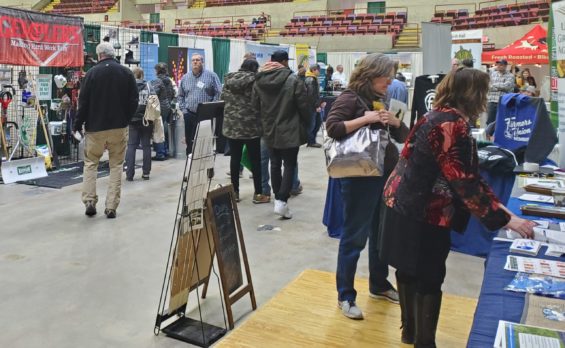 March 5, 2020 – Last week, I returned to the OFRF office feeling rejuvenated and re-energized after attending the Midwest Organic & Sustainable Education Service (MOSES) Conference in La Crosse, WI. This sense of energy and renewal came not only from the opportunity to return to my roots and enjoy the welcoming culture of the Midwest, it was also sparked by my interactions with the robust community of researchers, farmers, and non-profits at the conference. At a time when there is so much uncertainty, it was uplifting to be surrounded by a community of people dedicated to creating sustainable food systems that support people and the environment.
March 5, 2020 – Last week, I returned to the OFRF office feeling rejuvenated and re-energized after attending the Midwest Organic & Sustainable Education Service (MOSES) Conference in La Crosse, WI. This sense of energy and renewal came not only from the opportunity to return to my roots and enjoy the welcoming culture of the Midwest, it was also sparked by my interactions with the robust community of researchers, farmers, and non-profits at the conference. At a time when there is so much uncertainty, it was uplifting to be surrounded by a community of people dedicated to creating sustainable food systems that support people and the environment.
The highlight of my trip was the workshop on Resilient Soils that I hosted with Dr. Jess Gutknecht from the University of Minnesota. Given the extreme rainfall and flooding the Midwest experienced last year, farmers and ranchers were eager to learn about soil health building practices that can help maintain favorable growing conditions in the face of weather extremes. Jess got us off to a strong start with an overview of climate change and the long-term climate trend predictions for the Midwest. Her interactive presentation generated strong discussion among participants who shared not only their perceptions of the changing climate and how they are coping, but also their emotional response to these unpredictable times.
I followed by presenting soil health principles and practices that can improve overall soil health and water-holding capacity, characteristics important to dealing with extreme precipitation events. We concluded the workshop with small group discussions that allowed participants to dive deeper into specific topics like planting cover crops to absorb excess soil moisture and opportunities to reduce tillage to improve soil health.
In addition to hosting a workshop, OFRF also had a table in the exhibit hall displaying our hugely popular soil health guidebooks and resources on soil health management practices to reduce risk and increase the resiliency of farming systems. We also had postcards announcing the launch of two national surveys of farmers and ranchers we recently released in partnership with the Organic Seed Alliance—one survey is for certified organic producers and the other is for producers transitioning to organic certification. More information and links to both surveys can be found here.
I also had the opportunity to attend an organic research social where I met other researchers working to address pressing questions in the field of organic agriculture. The gathering gave everyone the opportunity to introduce themselves and share ideas for projects and collaborations, and was a welcome opportunity to slow down and listen. Throughout the discussions that evening, I was struck by the sense of camaraderie in the room. As a relatively new member to the organic research community, I was impressed by the strong network of researchers and their passion for building healthy food systems. I left feeling grateful to be welcomed into this community and am already looking forward to next year’s conference!
Submitted by Lauren Snyder, Ph.D., Education & Research Program Manager, OFRF


